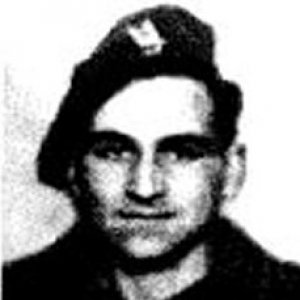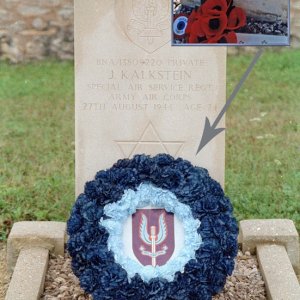- SURNAME
Kalkstein
- FORENAME
Joachim
- UNIT
2 SAS (C Squadron)
- RANK
Private
- NUMBER
BNA/13809220
- DATE OF DEATH
27th August 1944
- AGE
24
- GRAVESITE
Recey-sur-Ource Communal Cemetery,France Mil.Plot Row 1 Grave 9
- ADDITIONAL INFORMATION
parent unit Army Air Corps
former Pioneer Corps
born 21.7.1920 Berlin,Germany
resided "other African countries" (PRO)
parents were Polish
Jewish
fought in Spanish Civil War
served in Palestine Police and Czech Legion
Op.Wallace - parachute failed to open,Foret de Chatillon,France
notes from William Oakes
Yoachim Kalkstein (known as 'Jo' to his SAS comrades) was born in Berlin of Jewish Polish parentage. There were three children in the family, a daughter, Ursel (who went to live in Israel and lived on the Hazorea Kibbutz) and then twin boys, Jo and Norbert. Norbert later lived in New Zealand having emigrated there via the UK and Australia just before the 2nd World War. He was married with an adopted son but unfortunately suffered very poor health. He changed his name from Kalkstein. He may well have now died. Ursel died about 13 years ago.
Jo's parents like many after the 1st World War, left Poland and went to Germany to escape the pogroms which were still taking place in Eastern Europe after the 1st World War. There were over 2,000 pogroms in Poland in 1921.
Jo's father had served in the Polish Army during the 1st World War and served in Croatia. Jo's mother came from Posen, Poland.
The Kalkstein family ran a shoe shop in Berlin and for a few years the family were relatively ?well-off?. They lived in a part of Berlin that was later to become part of East Berlin.
In 1928, Jo's father sold his shop to become a Commission Agent in Textiles which was not a great success. The family then spent a couple of years in South Germany attempting a similar business venture. In 1930, the family moved back to Berlin.
By then and within two years, the Kalkstein family noticed a major change in the political climate. Ursel Kalkstein (later Levy) remembered seeing girls in her school class wearing Swastika badges. She noticed a marked change in the attitude of her teachers towards her. This reflected the rise of anti-Semitism orchestrated by the Nazis through their various discriminatory laws.
Ursel left school refusing to go back and transferred to a Jewish school instead. The two boys, Jo and Norbert also left school to start apprenticeships; Jo as a welder and Norbert as a wood craftsman. Ursel said that these were very stressful times and they had to rely on other members of the family for support.
In 1933, the burning of Jewish books and boycott of Jewish shops started to happen in Berlin and elsewhere. Ursel decided to leave Germany for good. As a 15? year old girl, having collected enough money from relatives, she emigrated to Palestine in July 1934. Ursel has said that she owed a lot to a wonderful woman called Rachia Friar who organised young people to emigrate to Israel. She left hoping that her parents and brothers would soon follow her.
This was not to be.
In 1939, the Kalkstein parents were sent to a Camp in Poland and later in Russia. Jo's father died as a consequence but his mother managed to survive the War and later moved to Israel to be with Ursel.
Jo was forced to cease his apprenticeship as the non-Jewish owner he worked for, was forced by Nazi laws to dismiss Jo. He then left for England to stay with a cousin (of the family Abramowicz).
Jo then went to Israel and Norbert went to Australia. Jo and his sister lost contact with Norbert but in 1989, Norbert visited his sister in Israel from New Zealand.
Jo's movements in Israel are a little unclear but a Report held in the British Public Record Office at Kew indicates how he was recruited into the British Army. Jo had somehow got to Spain to fight in the Spanish Civil War as part of the International Brigade formed to fight fascism. A report dated May 1943 refers to him as being aged 22, having served in the Palestine Police and later becoming a member of Czech Legion. He was by then an Electrician by trade. He is referred to as ?speaking German like a native? with some ?fair French?. He was then held in an Internment Camp at Berroughia in Algeria.
It was at this time that Jo joined the 2nd SAS which had been established under Bill Stirling, the brother of David Stirling the SAS founder. He returned to the UK in March 1944. He went with his regiment to Prestwick, Ayrshire, Scotland for pre-D-Day training.
In a first edition copy of the book 'Winged Dagger' (written about the wartime SAS Operations of 2nd SAS,) belonging to another SAS comrade William Cunningham (known as 'Joe' in the SAS) Joe writes a commentary within the book about Jo Kalkstein:
"This chap pestered the CO almost every day. Sir, I came not to wear the red headdress, which may please the eye, but, to parachute and fight against the Germans who have caused me to leave my home and country. I am a Jew and I have a score to settle. May I go today?"
Jo's persistence paid off but with sad and tragic consequences.
As part of 'Operation Hardy', on 27th August 1944, he was parachuted into the Forest of Chatillon in Burgundy with a fellow soldier ?Knocker? West at night-time at a height of about 600 feet. His parachute did not open. At dawn, his body was found under some trees as though he was asleep. His neck was broken so death had been instant. An act of negligence in packing a parachute by others was suspected but another explanation was that some battery acid from an airplane battery had seeped into his parachute and seriously damaged the essential static line.
There is a letter dated 21st October 1944 written by Jo's immediate superior, Captain Grant Hibbert to Jo's cousin, it reads...
"He was buried next day, after a full church service at which some 500 people attended, in the cemetery at Recey-sur-Qurce along with 7 RAF personnel who had crashed there some time previously. He will be a great loss to the squadron and the Regiment. He was very popular amongst the men and deservedly looked on as an extremely good, efficient and cheerful soldier by all the officers..."
Jo had been buried according to the rights of the Roman Catholic Church. Recey-sur-Ource is the birthplace of a famous French Dominican theologian of the 19th Century, Henri Dominique Lacordaire.
During a private 'pilgrimage' to France in 1996, whilst visiting SAS wartime sites and graves, I accompanied my father to Recey-sur-Ource to pay our respects at Jo's grave. Whilst not Jewish, we recited Kaddish and placed a wreath of poppies and some prayer stones. It was the disappointment of not finding the 'Star of David' on the headstone that spurred me into trying to find Jo's relatives and to contact the Commonwealth War Graves Commission (CWGC) to remedy this apparent omission. The CWGC responded, rightly stating that only relatives could request changes to be made to the headstone. They said that they had written to Jo's sister in what was then Palestine but did not receive any reply. Ursel later stated that she never received the letter.
In 1996, I contacted the 'Jewish Telegraph' and one of their journalists, Judith Hayman wrote up an article about Jo and the request to find relatives. It was by sheer good fortune that some months afterwards whilst at work in my office that the fax machine sprang into life as a letter arrived from Ursel advising me that she was the sister of Jo. One of her friends in the Kibbutz had seen the article and shown it to her.
Having successfully contacted Ursel Levy, I prepared some draft letters for Ursel to send to the CWGC and after a short while an inscription to be engraved on the headstone was agreed.
I returned to France in September 1997 but this time sadly without my father who had died in the March. I felt I needed to continue with the visit which we had both been preparing for before he died.
I went with my nephew Michael Oakes and the former Best Man to my father, John Sumnall (also a signaller with 2nd SAS). My nephew, with almost indecent haste, rushed into the cemetery at Recey to see if the alteration had been done to Jo's grave. We found, to our enormous pleasure, that the CWGC had remedied the omission and I was able to tell Ursel and send her a photograph of the new headstone. It was all done at no cost to the family.
In 1998, as part of the SAS' aim to place, every five years, a wreath on all the SAS wartime graves throughout the World, I placed a further wreath at Jo's grave. There was always a small pot plant of flowers on Jo's grave placed by the local village folk of Recey-sur-Ource. The grave is slightly set apart from the 7 RAF airmen from a crashed Halifax Bomber who also lie in the cemetery, similarly honoured by the French.
Following the contact made in 1996 with Ursel Levy, the headstone was remade and the grave can now be seen as follows.
* Because of Hitler's specific orders to hand over all captured SAS to the Gestapo/SS for immediate execution, the SAS disguised their SAS membership through membership of the Army Air Corps. Had Jo ever been captured, his German birth would have undoubtedly led to his immediate execution, a risk which he must have been aware before embarking upon his mission.
Acknowledgements
My late father, Freddie Oakes, Ursel Levy, Harry Vickers, DCM, Dave Buxton (a former SAS Archivist),Judith Hayman of the Jewish Telegraph, John Sumnall and Les Cooper (now both deceased) for their help in supplying information.
F William Oakes,
18 Tithe House Way,
Bradley Grange,
HUDDERSFIELD, HD2 1RD,
West Yorkshire, UK
00 44 1484 431320
00 44 7774 966929 (Mobile)
Thursday, September 08, 2011
DATE OF DEATH:
27-Aug-1944
Last edited by a moderator:





